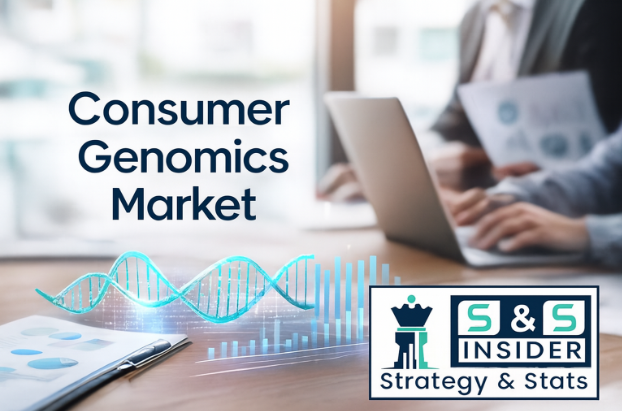Consumer Genomics Market Poised for Explosive Growth Through 2032
The global consumer genomics market, valued at USD 1.5 billion in 2023, is projected to surge to USD 10.8 billion by 2032, expanding at a remarkable CAGR of 24.6% from 2024 to 2032. This rapid rise reflects a fundamental shift in how consumers engage with personal health, ancestry insights, lifestyle management, and disease-risk assessment. With genetic sequencing now more accessible and affordable than ever, direct-to-consumer (DTC) genomics is becoming a mainstream pathway for individuals seeking deeper understanding of their biological makeup.
Rising Demand for Personalized Health Insights Fuels Momentum
The demand curve within the consumer genomics market is being reshaped by heightened public awareness around genetic susceptibility and proactive disease prevention. Consumers are increasingly turning to genetic insights to assess hereditary risks, make informed lifestyle choices, and explore ancestry-related information. According to the National Institutes of Health, more than 75,000 genetic tests are available to screen over 5,000 conditions, highlighting the breadth of genomic tools now within consumer reach. This depth of testing capability has created a new era of personalized healthcare—one in which individuals take active ownership of their genetic narratives.
The Centers for Disease Control and Prevention reports that approximately 1 in 31 newborns in the U.S. faces a genetic or inherited condition, a statistic that underscores the role of genomic screening in early detection. At the same time, the dramatic fall in sequencing costs—from USD 100 million in 2001 to under USD 1,000 in 2023—has democratized access to genomic testing. The National Human Genome Research Institute attributes this price drop to advances in sequencing technologies, allowing more consumers to explore health, ancestry, and lifestyle traits without clinical barriers.
Market Problem and the Need for Scalable Genetic Insights
Despite rapid progress, the consumer genomics market continues to confront major challenges that create opportunity for innovation. One of the most pressing issues is the gap between the availability of genetic data and consumers’ ability to interpret it accurately. While millions of people are now accessing their genetic profiles, many struggle to understand the medical implications without clinical guidance. This gap highlights the need for integrated tools that simplify genetic interpretation through AI, machine learning, and intuitive reporting.
Another critical issue is data privacy. As more genetic tests move outside clinical environments and into consumer settings, companies must reinforce security protocols to safeguard sensitive genomic information. Without robust privacy frameworks, adoption may be slowed by public hesitation. Nonetheless, leading industry players are responding by implementing stronger encryption, controlled data access, and transparent consent mechanisms to maintain trust.
Key Drivers and Restraints Shaping the Market
The consumer genomics market is propelled by a combination of technological, cultural, and clinical factors. The rise of preventive healthcare, heightened awareness of hereditary disorders, and consumer preference for convenient at-home testing continue to accelerate adoption. Major regulatory milestones, including FDA approval of several DTC genetic tests for health conditions, have expanded consumer confidence and market accessibility. The COVID-19 pandemic further underscored the importance of genomics in disease monitoring, with over 1.4 million SARS-CoV-2 genomes sequenced in the U.S. by 2023, reinforcing genomics as a critical pillar of public health.
However, market restraints persist. Regulatory variations across regions create hurdles for global expansion, while ethical concerns surrounding the use of hereditary data demand ongoing oversight. In addition, limited genomic literacy may restrict the full potential of personalized healthcare, requiring continued investment in education and awareness campaigns.
Key Opportunities and Challenges
Major growth opportunities lie in AI-enhanced genetic interpretation, personalized nutrition, sports performance genomics, reproductive health, and pharmacogenetics. As machine learning improves the prediction of disease risk, drug response, and wellness outcomes, the consumer genomics market stands to benefit from more precise and actionable insights. The NIH’s All of Us Research Program, which aims to sequence one million genomes by 2025, is expected to accelerate breakthroughs in personalized medicine and create new opportunities for both DTC companies and healthcare providers.
Challenges include ethical considerations involving hereditary risk communication, the need for improved accuracy across diverse populations, and strengthening consumer confidence in data handling. Addressing these concerns is essential for sustaining long-term market credibility.
Segmentation Insight Across Applications
The consumer genomics market spans a versatile range of applications. Genetic relatedness and ancestry testing continue to dominate consumer interest, followed closely by lifestyle, wellness, and nutrition insights tailored to genomic profiles. Diagnostics and reproductive health testing have gained momentum as consumers seek early detection of hereditary disorders. Personalized medicine and pharmacogenetic testing represent rapidly growing segments as patients and physicians integrate genomics into care pathways. Sports nutrition and performance-linked genetic traits are also emerging as high-demand categories.
Regional Landscape: North America Leads, Asia-Pacific Rapidly Expands
North America remains the most influential region in the consumer genomics market, supported by strong technological infrastructure, high consumer awareness, advanced healthcare integration, and a favorable regulatory environment. The U.S. market is especially dynamic, with widespread adoption of at-home genetic kits and active participation in genomic research programs.
Europe continues to expand steadily, driven by growing ancestry testing demand and supportive government initiatives. Meanwhile, Asia-Pacific is poised for the fastest growth as rising incomes, expanding digital healthcare ecosystems, and increasing interest in personalized medicine boost adoption across China, India, Japan, and South Korea. The Middle East, Africa, and Latin America are witnessing gradual uptake as genomics awareness spreads globally.
Key Players Driving Innovation in the Market
The competitive landscape of the consumer genomics market is defined by major innovators such as 23andMe, Ancestry.com, Illumina, Thermo Fisher Scientific, Myriad Genetics, Gene by Gene, Color Genomics, Helix, Fulgent Genetics, and Veritas Genetics. These companies continue to shape market evolution through advancements in sequencing technology, intuitive data platforms, expanded test offerings, and strategic collaborations.
Future Outlook
Looking ahead, the consumer genomics market is projected to undergo transformative change as sequencing technologies advance and personalized healthcare becomes fully integrated into daily decision-making. AI-driven insights will enhance test accuracy, while new applications in nutrition, mental health, and pharmacogenetics will broaden the consumer base. Growing awareness, cost reductions, and mainstream acceptance will position consumer genomics as a foundational element of modern health ecosystems.
Conclusion
The consumer genomics market is entering a new era defined by rapid growth, technological sophistication, and consumer empowerment. As genetic insights become more accessible, individuals are taking greater control of their health and lifestyle decisions. With strong market drivers, expanding opportunities, and increasing global traction, the industry is well-positioned to achieve its projected USD 10.8 billion valuation by 2032 and redefine the future of personalized healthcare.



